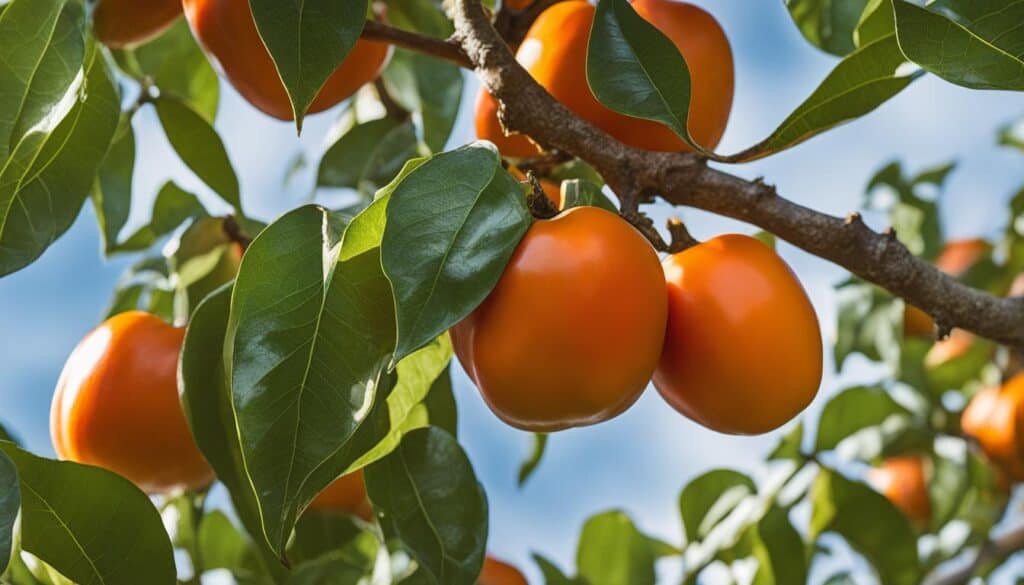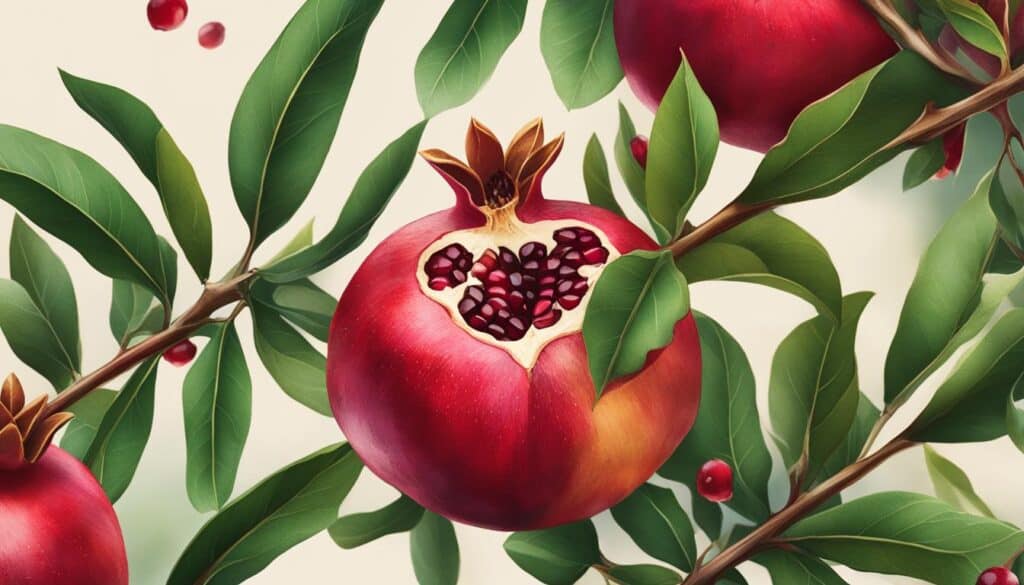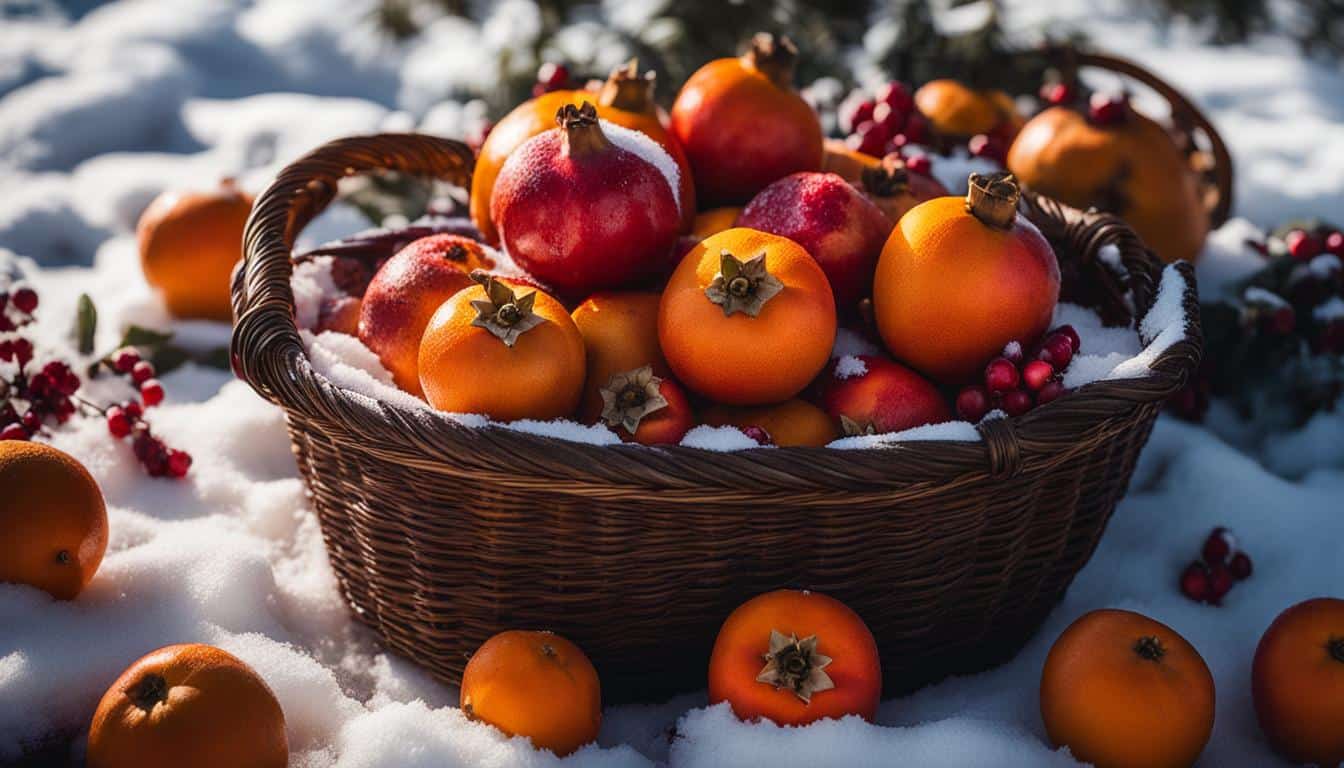Winter is often associated with cold weather and hearty comfort foods, but it’s also a great time to enjoy fresh fruits that are in season during this time. In this article, I’ll guide you through the best fruits to enjoy during the winter season, providing you with a healthy and delicious choice for your winter diet.
Key Takeaways:
- Winter is a great time to enjoy fresh fruits that are in season
- Incorporating winter fruits into your diet can provide a healthy and delicious choice
- Winter fruits are packed with essential nutrients like vitamins C and A, fiber, and antioxidants
- Adding variety to your winter diet with different winter fruits can enhance your overall well-being
- Get creative and experiment with recipes to incorporate winter fruits into your meals
Pears – A Fiber-Rich Winter Fruit
Pears are a fantastic choice for the winter season as they are rich in fiber. According to the USDA, one pear provides 5.58 grams of fiber. Fiber is beneficial for the immune system and can help maintain a healthy weight. It also promotes satiety, preventing overeating. Try incorporating pears into warm recipes with spices like cinnamon for a cozy winter treat.
Pears Nutritional Content
| Nutrient | Amount per 100g |
|---|---|
| Fiber | 3.1g |
| Vitamin C | 4mg |
| Vitamin K | 4.5µg |
| Potassium | 116mg |
Pears are not only delicious but also an excellent source of important nutrients. They are low in calories and provide a good amount of fiber, which can aid digestion and support a healthy gut. Pears also contain vitamins C and K, which are essential for immune function and bone health. Additionally, they are a good source of potassium, which helps regulate blood pressure. Incorporating pears into your winter diet can be a tasty way to boost your fiber intake and enjoy the many benefits they offer.
“Pears are a winter delight, packed with fiber that aids digestion and helps maintain a healthy weight.” – Nutritionist
Pineapple – Packed with Vitamin C and Disease-Fighting Properties

Pineapple is not only a delicious tropical fruit but also an excellent source of vitamin C, making it a valuable addition to your winter diet. With a cup of pineapple providing 78.9 milligrams of vitamin C, it can help boost your immune system and protect against common winter ailments.
But the benefits of pineapple don’t stop there. This juicy fruit is also packed with disease-fighting properties. It contains bromelain, an enzyme with anti-inflammatory properties that can aid in reducing swelling and discomfort. Additionally, pineapple is rich in antioxidants, which help protect the body against cell damage caused by free radicals.
To fully reap the benefits of pineapple, it’s important to choose ripe fruit that is sweet and fragrant. You can enjoy pineapple on its own as a refreshing snack, or incorporate it into various dishes. Add it to your morning smoothie, toss it into salads, or use it as a topping for yogurt or oatmeal. The possibilities are endless!
Cranberries – Heart-Protective and Vitamin C-Rich
Cranberries are not just a festive addition to your winter meals; they also offer significant benefits for heart health. These vibrant red berries contain compounds that can help lower cholesterol levels and reduce the risk of coronary artery disease. Incorporating cranberries into your diet can provide a tangy and nutritious twist to your winter menu.
In addition to their heart-protective properties, cranberries are also packed with vitamin C. One cup of whole, raw cranberries contains 14 milligrams of this essential nutrient. Vitamin C is known for its immune-boosting effects, especially during the winter season when colds and flu are common. Adding cranberries to your meals can help support your immune system and keep you healthy.
There are many ways to enjoy cranberries in your diet. You can make a refreshing cranberry sauce, add them to salads or smoothies, or bake them into muffins or bread. Their tart flavor adds a burst of freshness to both savory and sweet dishes. Get creative with cranberries this winter and reap the benefits they offer for your heart and immune health.
Table: Vitamin C Content in Winter Fruits (per cup)
| Fruit | Vitamin C (milligrams) |
|---|---|
| Oranges | 82 |
| Pineapple | 78.9 |
| Cranberries | 14 |
As seen in the table above, cranberries may not have the highest vitamin C content among winter fruits, but they still provide a significant amount. Combining cranberries with other vitamin C-rich fruits like oranges and pineapple can help ensure you meet your daily vitamin C needs for optimal health.
The vibrant red color of cranberries comes from anthocyanins, which are antioxidants that may contribute to their heart-protective properties.
So next time you’re planning your winter meals, don’t forget to include cranberries. Whether you enjoy them in a sauce, baked goods, or added to salads, cranberries offer a delicious way to support your heart health and boost your vitamin C intake.
Persimmon – Boosting Immune Function with Vitamin A

When it comes to boosting our immune function, persimmons are a winter fruit that shouldn’t be overlooked. These fruits are packed with vitamin A, which plays a crucial role in supporting our immune system and protecting against infectious diseases.
One medium-sized persimmon provides approximately 138 micrograms of vitamin A, making it an excellent source of this essential nutrient. Vitamin A helps to maintain the health of our mucus membranes, which act as a barrier against harmful pathogens. It also supports the function of our respiratory system, helping to defend against respiratory infections that are common during the winter months.
Incorporating persimmons into your winter diet is a great way to give your immune system a natural boost. You can enjoy persimmons on their own as a healthy snack, or add them to salads, smoothies, or even dessert recipes for a burst of sweet flavor and immune-boosting benefits.
| Benefits of Persimmons | Vitamin A Content per Medium Persimmon |
|---|---|
| Supports immune function | 138 micrograms |
| Protects against respiratory infections | 138 micrograms |
| Improves the health of mucus membranes | 138 micrograms |
“Incorporating persimmons into your winter diet is a great way to give your immune system a natural boost.”
So, why not add persimmons to your grocery list this winter season? Not only are they delicious, but they also offer important health benefits that can support your immune system and overall well-being.
Oranges – A Vitamin C Powerhouse for Winter Wellness
Oranges are well-known for their high vitamin C content, making them a powerhouse fruit for winter wellness. Vitamin C is essential for boosting and supporting the immune system, especially during the colder months. Just one orange contains nearly 82 milligrams of vitamin C, providing a significant portion of the recommended daily intake.
Not only does vitamin C strengthen the immune system, but it also acts as an antioxidant, helping to protect cells from damage caused by free radicals. This can aid in reducing the risk of chronic diseases and promoting overall health and well-being.
In addition to their nutritional value, oranges are also a versatile fruit that can be enjoyed in many ways. Whether eaten fresh, juiced, or incorporated into recipes, oranges add a burst of vibrant flavor to any dish. Their natural sweetness makes them a great snack on their own or a delicious addition to salads, smoothies, or even savory dishes like roasted chicken or grilled fish.
Benefits of Oranges for Winter Wellness:
- Boosts the immune system with high vitamin C content.
- Acts as an antioxidant, protecting against cell damage.
- Provides a burst of vibrant flavor to various dishes.
- Can be enjoyed fresh, juiced, or incorporated into recipes.
“Oranges are a delicious and nutritious fruit that can help support your immune system during the winter season.” – Nutritionist Jane Smith
Including oranges in your winter diet is a simple and tasty way to prioritize your health and wellness. So, grab a juicy orange and enjoy the many benefits it has to offer!
Grapefruit – Vitamin C and Possible Cancer-Fighting Abilities
Grapefruit is a refreshing and tangy winter fruit that not only provides a burst of flavor but also offers numerous health benefits. Rich in vitamin C, with half of a raw Florida grapefruit containing 43.7 milligrams, it is an excellent choice for boosting your immune system during the winter season. Vitamin C is known for its antioxidant properties, which can help protect cells from damage caused by free radicals.
But that’s not all – grapefruit also contains lycopene, a carotenoid pigment responsible for its vibrant pink or red color. Lycopene has been studied for its potential cancer-fighting properties, particularly in reducing the risk of prostate cancer. The antioxidant nature of lycopene helps neutralize free radicals and prevents damage to DNA.
Grapefruit is not only delicious but also a great source of vitamin C. Its high lycopene content makes it a fruit worth including in your diet for its potential cancer-fighting abilities.
Including grapefruit in your winter diet is simple and versatile. You can enjoy it on its own, in fruit salads, or as part of savory dishes like grilled chicken or seafood. Its tangy flavor pairs well with other citrus fruits, making it a delicious addition to fruit salads and refreshing beverages.
| Grapefruit Nutrition Facts (per serving) | Amount |
|---|---|
| Calories | 52 |
| Protein | 1 gram |
| Fat | 0 grams |
| Carbohydrates | 13 grams |
| Fiber | 2 grams |
| Vitamin C | 43.7 milligrams (73% DV) |
| Vitamin A | 1,331 IU (27% DV) |
| Lycopene | 2,047 mcg |
Remember to check with your healthcare provider if you are taking any medications, as grapefruit can interact with certain drugs. Overall, grapefruit is a nutritious and flavorful addition to your winter diet, offering both vitamin C and potential cancer-fighting properties.
Pomegranates – Bone-Strengthening and Antioxidant-Rich

Pomegranates are a festive winter fruit that not only adds a burst of flavor to your meals but also provides a range of health benefits. One of the key benefits of pomegranates is their ability to strengthen bones. This is due to their high vitamin K content, which plays a crucial role in promoting bone health and density. Incorporating pomegranates into your diet can help support your skeletal system and reduce the risk of osteoporosis.
In addition to being bone-strengthening, pomegranates are also rich in antioxidants. Antioxidants are compounds that help protect the body against free radicals, which can damage cells and contribute to chronic diseases. The antioxidants found in pomegranates, such as punicalagins and flavonoids, have been shown to have anti-inflammatory and anti-cancer properties. Including pomegranates in your winter diet can help boost your immune system and promote overall well-being.
To fully appreciate the benefits of pomegranates, consider incorporating them into your meals in creative ways. You can add pomegranate arils (the juicy seeds) to salads, yogurt bowls, or grain dishes for a burst of sweetness and texture. Pomegranate juice can be used as a flavorful base for smoothies or mixed into marinades for a tangy twist. Get creative in the kitchen and explore the versatility of this vibrant winter fruit.
Table: Nutritional Content of Pomegranates
| Nutrient | Amount per 100g |
|---|---|
| Calories | 83 |
| Protein | 1.7g |
| Fat | 1.2g |
| Carbohydrates | 18.7g |
| Fiber | 4g |
| Vitamin C | 10.2mg |
| Vitamin K | 16.4mcg |
| Potassium | 236mg |
As you can see from the table above, pomegranates are a low-calorie fruit that packs a nutritional punch. They are a good source of fiber, which aids in digestion and promotes satiety. Pomegranates also provide a moderate amount of vitamin C, which supports immune function, collagen synthesis, and iron absorption. Including pomegranates in your winter diet can help you meet your daily nutrient needs while enjoying a delicious and vibrant fruit.
Kiwi – Surprising Vitamin C Source and Fiber Boost

Kiwi is a remarkable winter fruit that packs a powerful punch of vitamin C, making it an excellent addition to your winter diet. With one fruit containing 56 milligrams of vitamin C, kiwi can provide a significant boost to your immune system, helping to keep you healthy during the colder months.
But that’s not all – kiwi also offers a generous amount of fiber. By enjoying a kiwi, you can give your digestive system a gentle nudge in the right direction. The fiber content helps regulate your digestion and keeps you feeling full and satisfied, making it a smart choice for those looking to maintain a healthy weight.
There are many ways to incorporate kiwi into your winter meals. You can slice it and enjoy it on its own as a refreshing snack, or add it to fruit salads for a burst of tangy sweetness. Kiwi can also be included in smoothies or used as a topping for yogurt or oatmeal, adding a vibrant touch to your breakfast routine. Get creative and experiment with different combinations to discover your favorite way to enjoy this surprising winter fruit!
The Benefits of Winter Fruits for Health and Wellness

Winter fruits offer numerous benefits for health and wellness. They are packed with essential nutrients like vitamin C, fiber, and antioxidants, which support the immune system, promote good gut health, and protect against chronic diseases. Incorporating a variety of winter fruits into your diet can provide a nutritious and flavorful winter experience.
Vitamin C is particularly important during the winter season as it helps boost the immune system and reduce the risk of colds and flu. Winter fruits like oranges, grapefruits, kiwis, and pineapples are rich sources of vitamin C, providing a natural way to strengthen your body’s defenses. Including these fruits in your daily diet can help keep you healthy and ward off winter illnesses.
Fiber is another key nutrient found in winter fruits, such as pears, apples, and cranberries. Fiber aids digestion, promotes satiety, and helps maintain a healthy weight. It also supports heart health by lowering cholesterol levels. By enjoying fiber-rich winter fruits, you can improve your overall well-being and protect against cardiovascular diseases.
Antioxidants play a crucial role in protecting the body from oxidative stress and preventing chronic diseases, including heart disease and cancer. Pomegranates, cranberries, and persimmons are excellent sources of antioxidants, which can strengthen your body’s natural defenses and promote long-term health. Including these antioxidant-rich fruits in your winter diet can have a positive impact on your well-being.
| Winter Fruits | Key Nutrients |
|---|---|
| Pears | Fiber, Vitamin C |
| Pineapples | Vitamin C, Antioxidants |
| Cranberries | Fiber, Heart-Protective Compounds |
| Persimmons | Vitamin A, Antioxidants |
| Oranges | Vitamin C, Fiber |
| Grapefruits | Vitamin C, Lycopene |
| Pomegranates | Fiber, Vitamin C, Antioxidants |
| Kiwis | Vitamin C, Fiber |
By incorporating winter fruits into your diet, you not only enjoy the delicious flavors but also reap the numerous health benefits they offer. Whether you snack on them fresh, add them to salads, or blend them into smoothies, winter fruits provide a convenient and tasty way to nourish your body during the colder months. So, don’t miss out on these nutritional powerhouses and make the most of the winter fruit bounty available to you.
Winter Fruit Recipe: Winter Fruit Salad
Try this refreshing and nutritious winter fruit salad recipe to enjoy the goodness of winter fruits:
- Ingredient:
- 1 pear
- 1 orange
- 1 kiwi
- 1 cup of pomegranate seeds
- 1 tablespoon of honey
- 1 tablespoon of lime juice
- Instructions:
- Wash and chop the pear, orange, and kiwi into bite-sized pieces.
- In a bowl, combine the chopped fruits and pomegranate seeds.
- In a separate small bowl, whisk together the honey and lime juice.
- Pour the honey-lime dressing over the fruit mixture and gently toss to coat.
- Refrigerate the salad for at least 30 minutes to allow the flavors to meld.
- Serve chilled and enjoy!
This winter fruit salad is not only delicious but also packed with vitamins, fiber, and antioxidants. It makes for a perfect healthy snack or a light dessert. Feel free to customize the fruit combination based on your preferences and the availability of winter fruits in your area.
How to Enjoy Winter Fruits in Your Diet
Winter fruits offer a wide array of flavors and nutrients that can be enjoyed in various ways. Here are some simple and delicious ways to incorporate winter fruits into your diet:
1. Fresh and Simple:
One of the easiest ways to enjoy winter fruits is to eat them fresh and as they are. Apples, pears, oranges, and kiwis make for convenient snacks that are packed with vitamins and fiber. Simply wash the fruits and enjoy them on their own or slice them up for a fruit salad.
2. Warm and Cozy:
Winter is the perfect time to enjoy warm and comforting dishes. Use winter fruits like pears, apples, and persimmons to create cozy recipes like baked fruit crumbles, poached fruits, or roasted fruit desserts. These warm dishes bring out the natural sweetness of the fruits and make for a delicious treat on chilly days.
3. Blend it Up:
Take advantage of winter fruits by incorporating them into smoothies. Blend together your favorite winter fruits like pineapple, pomegranates, and berries with some yogurt or non-dairy milk for a nutritious and refreshing drink. Add a handful of spinach or kale for an extra boost of vitamins and minerals.
4. Get Creative:
Experiment with winter fruits in savory dishes to add a unique twist to your meals. For example, citrus fruits like grapefruits can be used in salads to add a burst of freshness and tanginess. Pomegranate seeds can be sprinkled over roasted vegetables for an added pop of color and flavor. Don’t be afraid to get creative and try new flavor combinations!
By incorporating winter fruits into your diet, you can enjoy their delicious flavors while benefiting from their nutritional value. Whether you prefer them fresh, warm, blended, or in savory dishes, there are plenty of ways to enjoy the abundance of winter fruits.
Conclusion
In conclusion, winter fruits offer a delicious and healthy choice for the winter season. They are packed with essential nutrients like vitamin C, fiber, and antioxidants, which are crucial for supporting your immune system and overall well-being. Incorporating a variety of winter fruits into your diet can provide a nutritious and flavorful winter experience.
Whether it’s the fiber-rich pears, vitamin C-packed pineapple and oranges, heart-protective cranberries, or immune-boosting persimmons and kiwis, winter fruits offer a wide range of benefits for your health. These fruits not only add vibrant flavors to your winter meals but also contribute to good gut health and help protect against chronic diseases.
There are numerous ways to enjoy winter fruits in your diet. You can eat them fresh, incorporate them into salads, blend them into smoothies, or use them in warm recipes with spices. They also make a great addition to fruit salads and can be used as toppings for yogurt or oatmeal. Don’t be afraid to get creative and experiment with different flavor combinations!
Incorporating winter fruits into your diet is a simple and effective way to stay healthy and nourished during the winter season. So, make the most of these seasonal delights and enjoy the numerous health benefits they have to offer. Start including winter fruits in your meals today and give your body the nutrition it deserves!
FAQ
What are the best fruits to enjoy during the winter season?
The best fruits to enjoy during the winter season include pears, pineapple, cranberries, persimmon, oranges, grapefruit, pomegranates, and kiwi.
Why should I include pears in my winter diet?
Pears are a fantastic choice for the winter season as they are rich in fiber, which is beneficial for the immune system and can help maintain a healthy weight.
What are the benefits of including pineapple in my winter diet?
Pineapple is an excellent source of vitamin C and has disease-fighting anti-inflammatory and antioxidant properties, benefiting the nervous and digestive systems.
How can cranberries benefit my health during the winter season?
Cranberries add a festive touch to winter meals and offer heart-protective benefits. They can help lower cholesterol levels and reduce the risk of coronary artery disease.
What makes persimmon a good choice for the winter season?
Persimmon is a winter fruit that can bolster your immune system with its high vitamin A content, enhancing immune function and helping to protect against infectious diseases.
Why are oranges recommended for winter wellness?
Oranges are well-known for their high vitamin C content, which is essential for immune health, especially during the winter season.
What are the health benefits of including grapefruit in my winter diet?
Grapefruit is abundant in vitamin C and lycopene, which has antioxidant properties and may reduce the risk of certain types of cancer. It provides a delicious and healthy addition to your winter diet.
How can pomegranates promote health and wellness during the winter season?
Pomegranates are a festive winter fruit packed with fiber, vitamin C, and vitamin K. They contribute to blood clotting, promote healthy bones, and have antioxidant properties that support good gut bacteria and skin health.
Why should I consider including kiwi in my winter diet?
Kiwi is a surprising winter fruit that provides a high dose of vitamin C and is an excellent source of vitamin K. It can give your immune system a morning boost and increase your fiber intake when consumed with the skin on.
What are the benefits of winter fruits for health and wellness?
Winter fruits are packed with essential nutrients like vitamin C, fiber, and antioxidants, which support the immune system, promote good gut health, and protect against chronic diseases.
How can I enjoy winter fruits in my diet?
There are many ways to enjoy winter fruits in your diet. You can eat them fresh, incorporate them into salads, blend them into smoothies, or use them in warm recipes with spices. Get creative and experiment with different flavor combinations!
What are the final thoughts on winter fruits for a healthy winter season?
Winter fruits provide a delicious and healthy choice for your winter season. They offer a wide range of nutrients, including vitamin C, fiber, and antioxidants, which are crucial for supporting your immune system and overall well-being.





Leave a Reply